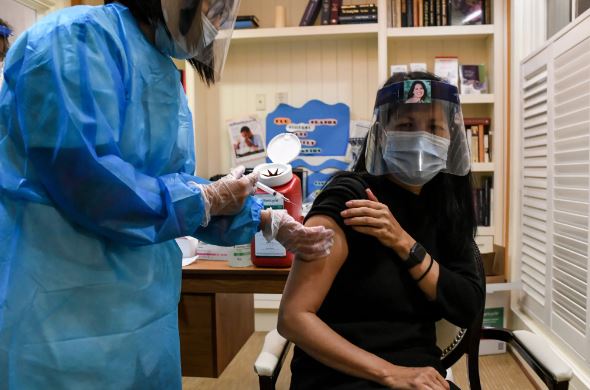She has caught it twice and is keen to acquire the recently licenced vaccination because her immune system is compromised by chronic leukaemia.
Two weeks ago, the newest vaccination received approval from the CDC, and only recently, the public was allowed to get its hands on some. Infection rates among the elderly are growing, from a low of 2.2 per 1,000 residents in mid-June to a high of 9.7 per 1,000 residents in mid-September. However, many nursing facilities will not begin inoculations until far into October or even November.
The federal government ceased purchasing and distributing Covid vaccinations in May, after the conclusion of the declared public health emergency. That’s made things more difficult for nursing facility managers, who have had a tough time convincing residents and staff to get more injections throughout the pandemic.
During the first two years of the epidemic, the coronavirus wiped out nursing homes, killing over 200,000 people. Without a government agreement to purchase the shots, vaccine manufacturers will only make large quantities once C.D.C. experts recommend approval, according to Elizabeth Sobczyk, project director of Moving Needles, a C.D.C.-funded initiative to improve adult immunisation rates in long-term care facilities.
More healthcare workers may have to leave their shifts this year to get vaccinations at pharmacies or clinics, rather than at their workplaces. Many facilities are operating clinics, with their long-term care pharmacists delivering the vaccination as previously; however, paying insurance for the vaccine for both residents and staff presents additional logistical hurdles.
Nursing institutions have ceased providing on-site vaccination clinics, according to Leslie Frane, executive vice president of Service Employees International Union, which represents more than 134,000 workers in 1,465 nursing homes. More employees, she said, will start avoiding their vaccinations as a result.
Free Covid injections are available at participating pharmacies, health clinics, and doctors’ offices that are listed on www.vaccines.gov for the 25–30 million people who either do not have health insurance or whose insurance does not cover the full cost of the vaccine. Ms. Frane claimed that staff were unaware of the programme, and Mr. Worz claimed that distribution favoured major pharmacy chains, making it more difficult for people in remote areas to get their hands on the medication they needed. Officials from the federal government said that 627 of the 19,400 independent pharmacies in the country were participating in the programme, with an additional 100 being added.
However, nurse and aid staff resistance to immunisation remains a significant barrier. More than a dozen nursing facilities in the west are owned or operated by Avalon Health Care Group, and the company does not require its employees to get flu shots. Avalon’s chief medical officer, Dr. Sabine von Preyss-Friedman, has stated that she does not plan on abandoning the initiative and attempts to discuss the reasons with each employee.
Staff employees at Avalon’s facilities have been incentivized with small cash bonuses in order to increase vaccination rates. The efforts of individuals who have previously organised competitions between different units will be resumed this year, with the winners receiving rewards like a pizza party or a drawing for a gift voucher from a department shop.
The medical director of three nursing facilities in Richmond, Virginia, Jim Wright, indicated that neither financial incentives nor polite persuasion had worked to change the attitudes of his staff. He stated they are often between the ages of 20 and 30, and that they are unconcerned with contracting Covid because so many of them have already experienced its effects.
The pharmacy at Edenwald’s nearby Giant supermarket will be in charge of giving the injections in the auditorium of the assisted living facility. Clinics later this month will have sign-up papers available. Managers at the facility have assured workers that they will foot the tab for those without health insurance, even though they are charging the workers’ insurance.
Respiratory syncytial virus (R.S.V.) vaccines will now be made available to the elderly living in nursing homes. There are as many as 10,000 annual fatalities and 160,000 annual hospitalisations among the elderly due to this illness. Most nursing homes are giving their residents a combination of the flu shot and either the Covid or R.S.V. vaccines, but not all three at once.
Dr. Gaur warned that clinic staff would need to spend more time discussing the rationale behind R.S.V. vaccinations because of the vaccine’s novelty and patients’ lack of experience with the disease.
Ms. Wityk’s nursing home, Spurgeon Manor, is working with the pharmacist at a local Hy-Vee grocery store to provide the Covid injection to 85 residents and workers at Spurgeon Manor and the adjacent assisted living centre in early October.
After contracting Covid last winter, resident and retired truck driver Lee Giese, 95, expressed anticipation for the newest vaccination. He attributes his lack of severe symptoms to the immunisations he received as a child.

